Progress on land reform has been made but there is much further to go

Land reform is difficult. It involves challenging a range of fiscal, legal, and political issues that are deeply entrenched not only in our law but in the history whereby men who owned land and property had the exclusive right to sit in the Parliament that made the laws governing the ownership of that land.
In 1996, I published a book called Who Owns Scotland. In it, I argued that reform could never happen if Scotland relied on the UK Parliament to take it forward. Not only was the Secretary of State given limited legislative opportunities but the House of Lords was stuffed full of hereditary aristocracy who owned the land that would be the subject of reform.
It was they who ensured that primogeniture was only abolished in 1964, who ensured that children even to this day have no legal right to inherit land and who have contrived to ensure that a wide range of exemptions from tax apply to landed estates that do not apply to other property owners.
The Scottish Parliament changed all that and land reform is frequently cited as one of its success stories. I agree but only up to a point. Some useful measures have been passed on community ownership, public access, national parks, feudal abolition and private rented housing. But this week, we were given a stark reminder that the core problem is still with us.
Fundamentally this is a debate about power. The derivation, distribution and exercise of power is in fact the central problem that underlies all others. So it was therefore welcome to see the Scottish Land Commission report this week on the issues associated with the scale and concentration of landownership in Scotland.
Abuses of power are only possible because such power exists in the first place and because the land market is so open to anyone from anywhere in the world. Quite literally, the market is unregulated and, as the Commission notes, the evidence demonstrates a pattern of market and social power associated with landownership that is consistent with characteristics of monopoly power in other economic sectors. Indeed, if land was subject to the powers of the Competitions and Markets Authority, there would be a clear case for intervention.
Tony Benn famously asked 5 questions of those who hold power
"What power have you got?”
"Where did you get it from?”
"In whose interests do you use it?”
"To whom are you accountable?”
"How do we get rid of you?"
"Anyone who cannot answer the last of those questions does not live in a democratic system."
The core challenge that faces the Scottish Parliament is how to redistribute power over land in the public interest – in the interests of the many and not the few.
It is about how, in short, to democratise land and two examples highlight the pressing need for change.
Applecross Estate in Wester Ross is a 61,000 acre estate. It was owned by the Wills tobacco family but in the 1970s they transferred ownership to a company with charitable status in order to avoid tax.
Since then, the Applecross Trust has operated as a closed-shop with Directors who live in the south of England and a fragile community which has struggled to secure land to meet basic needs for housing and other essential services.
In September 2012, 100 of us including the late Charles Kennedy MP, wrote formal letters to the registered office of the charity in Edinburgh applying to become members as, under the terms of the charity’s constitution was our right. All applications were refused point blank.
Here is a landowner operating as a Scottish charity, exercising monopoly control over vast swathes of land and denying anyone else – even the local MP – from joining and participating in the affairs of the charity.
A similar situation exists on the Isle of Bute – again owned by a charity, the Mount Stuart Trust - again established to avoid tax liabilities for the Marquess of Bute– and operating a closed shop. Not only did they refuse applications from, among others myself and the local MSP, Mike Russell, but then passed a special resolution to limit membership and give the Marquess of Bute exclusive rights to appoint up to 4 directors on terms and conditions dictated by the person holding the “Title and Dignity of the Marquess of Bute.”
We abolished feudal tenure in 2000 but it lives on in the arcane, anti-democratic manner described in these two places.
Land reform is a process whereby laws are changed that modify or change the arrangements governing the possession and use of land in Scotland in the public interest. That implies a wide range of measures dealing with all land – urban, rural, marine and public as well as private ownership. It is about fiscal policy, inheritance law, planning, land tenure and many other areas of law and policy.
Land reform to date has tinkered at the margins for too long. There is nothing in the Land Commission’s report that comes as a surprise to land reformers but it is refreshing to read advice from a government agency that tackles this question head on and recommends new powers of intervention as well as reform in the way that land is taxed.
If Scottish Ministers approve these recommendations then we could be on the brink of resolving the central problem of Scottish landownership, namely the centuries-long persistence of hegemonic landed power.
I am not holding my breath, however. Scottish Ministers have had recent opportunities to act – on inheritance law and on land taxation for example and have avoided both. If this report is to be the tipping point that it could be, Government needs to be far clearer about its intentions and timescales.
